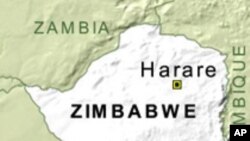The International Organization for Migration says nearly 25,000 displaced children in Zimbabwe will benefit from a new program to improve conditions in dozens of marginalized and neglected schools. The program is targeting 40 schools in the capital, Harare, and in the districts of Hwange, Makoni, Mutare and Chpinge.
The International Organization for Migration says the educational system in Zimbabwe has suffered from years of neglect. The IOM, Save the Children U.K., and the International Rescue Committee have targeted 40 schools in need of emergency assistance.
IOM spokeswoman Jemini Pandya tells VOA the program aims to tackle some of the most pressing issues faced by displaced children in Zimbabwe.
"The situation of the national educational system is quite dire," Pandya said. "It is characterized by a lot of resignations, absenteeism, and low morale among the teachers. There is very significant numbers of school dropouts and violence against the children is considerably bad. But, much worse, we feel amongst children who are from mobile and vulnerable populations."
A rapid assessment of six urban schools by Save the Children UK in 2008 shows a nearly 55-percent drop in school enrollment and a nearly 70-percent drop in teacher presence.
Pandya says the study also shows a consistent pattern of school-based violence and an alarming degradation in school infrastructure. She says the water and sanitation facilities are so bad they are having a serious impact on the education and health of the children.
Pandya notes the huge cholera outbreak last year caused the collapse of the country's economic and social structures. And, this has had a serious impact on the educational system.
"And, these facilities or lack of them had a huge role to play in the health and safety of the children," Pandya said. "So, it is critical that we actually do something to make sure that the schools, and particularly in places that we know there are large numbers of mobile, displaced and vulnerable populations, that they are in a much better state. That, they are better equipped so we can do something to make sure that already vulnerable people are not made even more vulnerable by simply just going to school."
Pandya says the aid organizations will work to improve the physical, protective and social environment at school.
She says they will refurbish and re-equip school facilities. She says children will be taught so-called life skills. That is they will learn how to deal with the risk of HIV and AIDS and sexual and gender-based violence.
She says teachers will be supported in their work through training on a range of issues including protection of children in emergency situations and prevention of family separation.
The program is being funded by a grant of $750,000 from the U.N. Emergency Fund.






